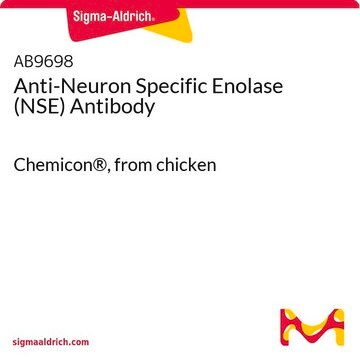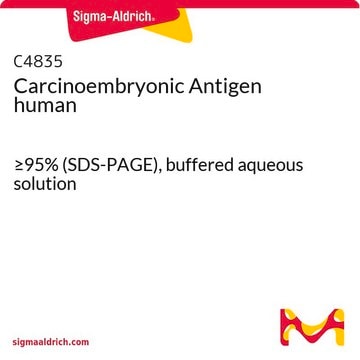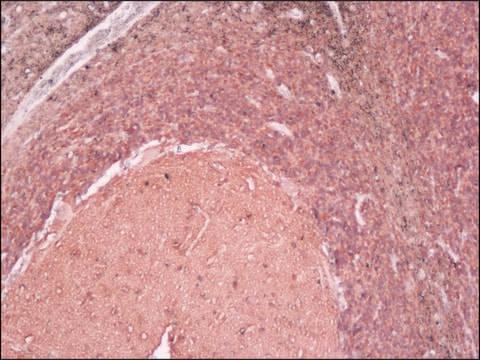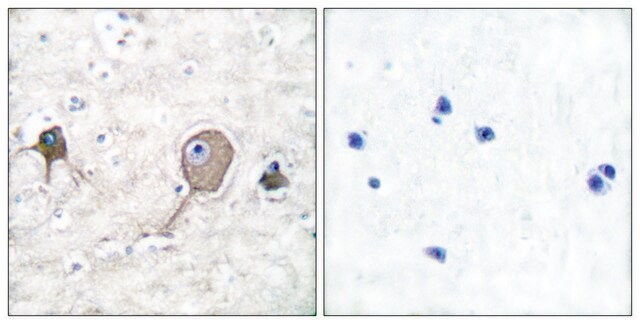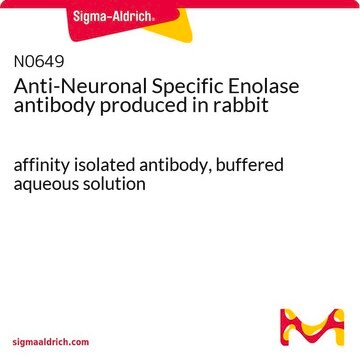MAB324
Anti-Neuron Specific Enolase Antibody, clone 5E2
clone 5E2, Chemicon®, from mouse
Synonym(s):
NSE
Sign Into View Organizational & Contract Pricing
All Photos(1)
About This Item
UNSPSC Code:
12352203
eCl@ss:
32160702
NACRES:
NA.41
Recommended Products
biological source
mouse
Quality Level
antibody form
purified immunoglobulin
clone
5E2, monoclonal
species reactivity
human
manufacturer/tradename
Chemicon®
technique(s)
ELISA: suitable
immunocytochemistry: suitable
immunohistochemistry: suitable (paraffin)
western blot: suitable
isotype
IgG2a
NCBI accession no.
UniProt accession no.
shipped in
wet ice
target post-translational modification
unmodified
Specificity
Human gamma neuron specific enolase. Recognizes a 45kD band corresponding to gamma NSE on immunoblots of human brain extracts.
Immunogen
Neuron-specific enolase from human brain.
Application
Anti-Neuron Specific Enolase Antibody, clone 5E2 detects level of Neuron Specific Enolase & has been published & validated for use in ELISA, WB, IC, IH(P).
Immunoblotting
ELISA
Immunohistochemistry. May be used on formalin-fixed, paraffin embedded sections.
Optimal working dilutions must be determined by end user.
ELISA
Immunohistochemistry. May be used on formalin-fixed, paraffin embedded sections.
Optimal working dilutions must be determined by end user.
Research Category
Neuroscience
Neuroscience
Research Sub Category
Neuronal & Glial Markers
Neuronal & Glial Markers
Linkage
Replaces: CBL220
Physical form
Format: Purified
Liquid in PBS pH 7.4 containing 0.1% sodium azide.
Storage and Stability
Maintain at 2-8 °C for up to 12 months under sterile conditions.
Other Notes
Concentration: Please refer to the Certificate of Analysis for the lot-specific concentration.
Legal Information
CHEMICON is a registered trademark of Merck KGaA, Darmstadt, Germany
Disclaimer
Unless otherwise stated in our catalog or other company documentation accompanying the product(s), our products are intended for research use only and are not to be used for any other purpose, which includes but is not limited to, unauthorized commercial uses, in vitro diagnostic uses, ex vivo or in vivo therapeutic uses or any type of consumption or application to humans or animals.
Storage Class Code
10 - Combustible liquids
WGK
WGK 2
Flash Point(F)
Not applicable
Flash Point(C)
Not applicable
Certificates of Analysis (COA)
Search for Certificates of Analysis (COA) by entering the products Lot/Batch Number. Lot and Batch Numbers can be found on a product’s label following the words ‘Lot’ or ‘Batch’.
Already Own This Product?
Find documentation for the products that you have recently purchased in the Document Library.
Benedito A Carneiro et al.
Clinical cancer research : an official journal of the American Association for Cancer Research, 24(12), 2732-2739 (2018-03-22)
Purpose: Small cell carcinoma of the prostate (SCCP) is an aggressive disease that can arise de novo or by transdifferentiation from prostate adenocarcinoma. Alterations in anaplastic lymphoma kinase (ALK) gene are involved in neuroblastoma, lung cancer, and other malignancies, but
Formation of neurospheres from human embryonal carcinoma stem cells.
Grace M Horrocks, Lyndsey Lauder, Rebecca Stewart, Stefan Przyborski
Biochemical and biophysical research communications null
Maja Mustapic et al.
Frontiers in neuroscience, 11, 278-278 (2017-06-08)
Our team has been a pioneer in harvesting extracellular vesicles (EVs) enriched for neuronal origin from peripheral blood and using them as a biomarker discovery platform for neurological disorders. This methodology has demonstrated excellent diagnostic and predictive performance for Alzheimer's
Bcl-XL modulates the differentiation of immortalized human neural stem cells.
Liste, I; Garcia-Garcia, E; Bueno, C; Martinez-Serrano, A
Cell Death and Differentiation null
Disruption of cerebral cortex MET signaling in autism spectrum disorder.
Daniel B Campbell,
Annals of Neurology null
Our team of scientists has experience in all areas of research including Life Science, Material Science, Chemical Synthesis, Chromatography, Analytical and many others.
Contact Technical Service